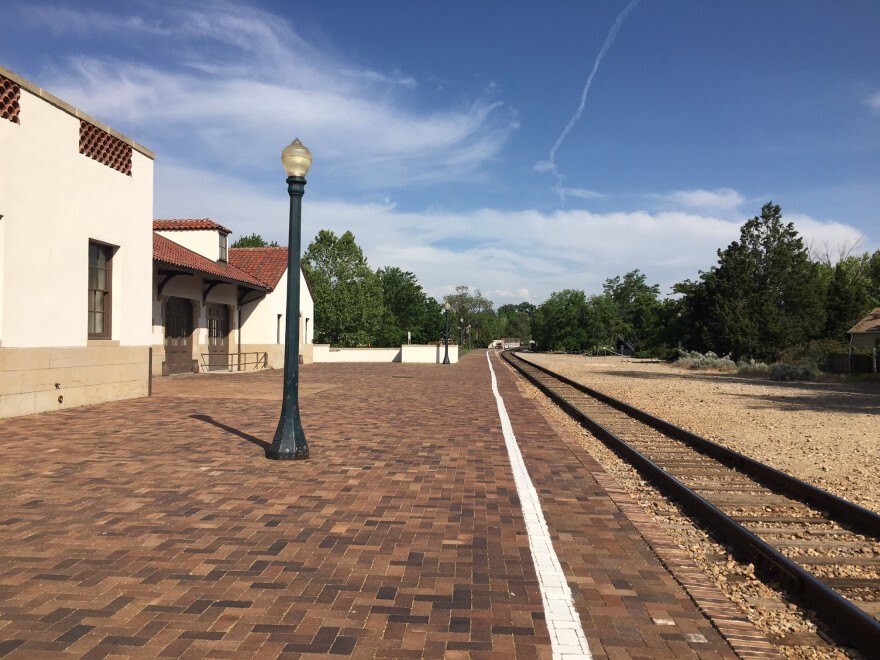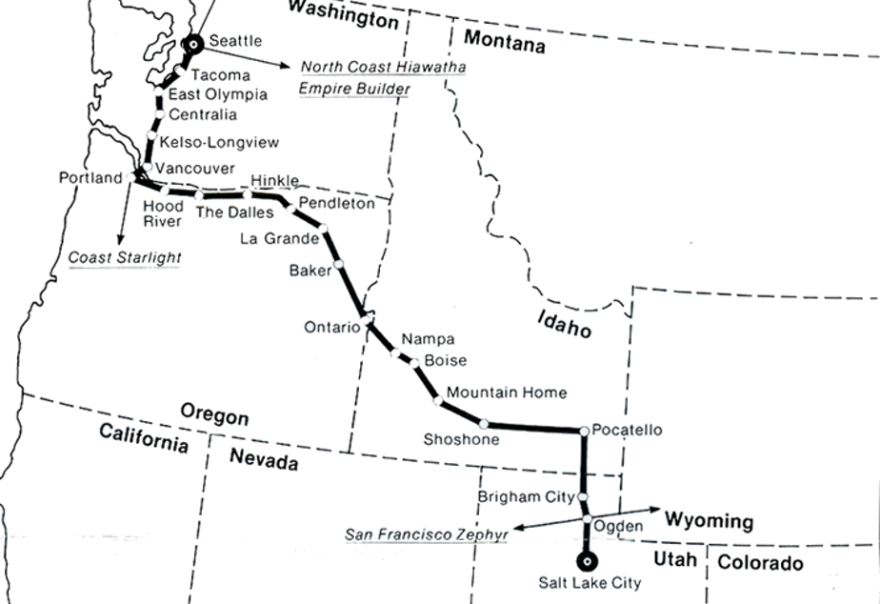Nearly a quarter century since Amtrak routinely rolled into the Boise Depot, there’s a renewed effort to restore the service to the Treasure Valley.
The Boise City Council unanimously passed a resolution restoring the Pioneer Route between Salt Lake City and Portland, which would include a stop at the long-dormant depot overlooking Boise’s downtown.
As much as a good many people love trains, Dan Bilka, coordinator of the Greater Northwest Passenger Rail Working Group says the idea of restoring the route is more practical than emotional.
“A lot of people may love and appreciate trains, but mostly we're focusing at it from a practical notion. Like I always say, ‘You can get tourists to ride regular passenger trains, but they can't get passengers to ride a tourist train.’”
Bilka visited with Morning Edition host George Prentice to talk about what it would take for Amtrak to roll back to Boise.
“Passenger rail is a great asset for people in communities to be able to travel between one place and another place, especially in our greater Northwest region, where you have a lot of ‘windshield time’ between places.”Dan Bilka
Read the full transcript below:

GEORGE PRENTICE: It is Morning Edition on Boise State Public Radio News. Good morning. I'm George Prentice. 1997: Bill Clinton was president. Those of us going to the movies? We were seeing a new film called Titanic. And the first Harry Potter book was published in 1997. It was also the last time Amtrak rolled through Boise and the Treasure Valley. And while there have been a few attempts to bring the service back, there is a new effort that has grabbed our attention. Dan Bilka is here. He is Coordinator at the Greater Northwest Passenger Rail Working Group. Dan, good morning.
DAN BILKA: Good morning. It's great to be here
PRENTICE: For the record. Tell me about a couple of other organizations that you are affiliated with.
BILKA: Sure. I'm a board member with the National Rail Passengers Association, which is the National Passenger Rail and Transit Advocacy Organization based out of Washington, D.C. And we have number of members throughout all 50 states and working on advocacy on the national level, and also with our state partners such as All Aboard Washington State in Washington. And I'm on the board of the Colorado Rail Passengers Association.
PRENTICE: Full disclosure, I love trains. I love commercial trains. But truly… how much of this effort is a romantic notion and how much of it is practical?

BILKA: I would say absolutely that a lot of people may love and appreciate trains, but mostly we're focusing at it from a practical notion. Like I always say, “You can get tourists to ride regular passenger trains, but they can't get passengers to ride a tourist train.” That passenger rail is a great asset for people in communities to be able to travel between one place and another place, especially in our greater Northwest region, where you have a lot of windshield time between places. And if you don't have an automobile or you don't have access to one, than you are very limited in your travel options.
PRENTICE: Does it matter who's in the White House to advance this conversation?
BILKA: I wouldn't say that it matters directly, but it can be helpful. But ultimately, it's on Congress. Congress directs Amtrak and it's on Congress to work through the legislation for what passenger rail can and will be in the United States. But it can be a great asset to have a proponent in the White House. But it's not the be all and end all.
PRENTICE: So over the years, we've seen airline service improved in Boise and in cities across our region because there have been… for lack of a better phrase, guaranteed seats, which is to say airlines were paid for seats if they couldn't sell a certain number of seats. Is that a formula that works for rail service?
BILKA: I haven't heard of that formula being utilized in the essence of rail service, but we're envisioning rail service… passenger rail service… as one part of an interconnected, interdependent transportation network. So, to be able to work with our airline, highway and aviation partners for the full transportation network.
PRENTICE: Is it a matter of the Pioneer Line being profitable? Or is it a matter of it just not losing too much money?
BILKA: Well, to bring it back….back in 1978, Congress actually removed the mandate that Amtrak must, quote unquote, make a profit, that we get fixated on the wrong things when we're looking at if it makes a profit or that we need to look at the value. What is the value that the passenger trains bring? For example, the Southwest Chief and Empire Builder bring over 10 times the rate of return on investment to the communities that they serve.

PRENTICE: Dan, talk to me about advancing this effort. What do you think needs to be done or could be done to move this…pardon me…down the track a little further.
BILKA: Absolutely. And to kind of bring it full circle with our greater Northwest Passenger Rail Working Group that we started informally and that people all throughout the region have been trying on their own efforts to get passenger rail restarted, wanted to get together and kind of compare notes and try to think outside the box. How can we work together to realize things when other efforts have petered out? And I want to give a personal shout out to President Elaine Clegg of the Boise City Council for all of her work through the greater region on reaching out over the borders, over state borders to like eastern Oregon. And what do we work with in our greater region? People in commerce, friendly travel or transcends state borders. But we don't have a good facilitating mechanism, so that’s we started working and dialoging together and trying to think in how we can get our congressional delegations on the same page to get materialized. Passenger rail gains when 12 years ago… and they did the studies on the Pioneer and North Coast Hiawatha… they realized that both routes would be instrumental into our national network system. But at that time, there wasn't the funding for it, so we're working together to not only secure the routes, but the funding for them.
PRENTICE: Well, you've been tracking this. Are we inching forward on this?
BILKA: I think throughout the Greater Northwest Region and really throughout the nation, that a lot of people are waking up to what the need and demand is and the economic returns of passenger rail in general. Again, it's not the be all and end. All of transportation systems works together with other transportation modes. Now, people are realizing how rail in general, both passenger and freight, are instrumental to our national economy ever so slowly. Positive developments are happening, but we still have to work hard to be able to get what our system can really be in the end.
PRENTICE: You've seen the data: as far as the number of people and the variety of folks… the demographics that are moving to Idaho from communities that do have Amtrak service… and what their expectations might be as new citizens of this region, That has to work in your favor.
BILKA: I think I would definitely say so when they last did the analysis in 2008 of the Pioneer Route, that they were looking at the historical numbers there from like the 90s or so before the Pioneer was discontinued and trying to use that as the sole baseline for doing the passenger projections. But looking at the travel dynamics that people… whether you live in Boise or Caldwell or somewhere else along the line, you need to have these transportation modes. And looking at it in a holistic sense. And that being a major growth region in the nation there. I believe that you were one of the leaders, if not a top leader in the nation for a couple of years. And that is an instrumental component of our transportation network.
PRENTICE: He is Dan Belka, coordinator of the Greater Northwest Passenger Rail Working Group. We are anxious to get updates on this as it moves forward. Thank you for giving us some time this morning.
BILKA: Thank you. It's been a pleasure.
Find reporter George Prentice on Twitter @georgepren
Copyright 2021 Boise State Public Radio



